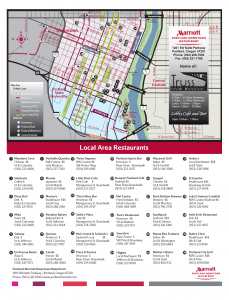Portland Food Carts and Restaurants
This is information regarding the Portland Food Carts!
You can also find information about restaurants on the About Portland page found here:
Proceedings for the Main Conference and Extended Abstracts
The Table of Contents for the Main Conference and Extended Abstracts is now available with Table of Contents. You can visit the following links for this information.
Poster Instructions for Late Breaking Reports now available
Poster Format for Late Breaking Reports:
All posters should be A0 format or 36″ x 48″ in portrait format. If you have any questions on the format please contact the Late Breaking Reports Chairs at: latebreakingreports15@
Full Program is now posted!
The Full Program for the 2015 10th ACM/IEEE International Conference on Human-Robot Interaction is now available! We look forward to seeing you in Portland for HRI 2015!
Overview
HRI 2015 is the 10th Annual Conference for basic and applied human-robot interaction research. Researchers from across the world attend and submit their best work to HRI to exchange ideas about the latest theories, technology, data, and videos furthering the state-of-the-art in human-robot interaction.
Each year, the HRI Conference highlights a particular area through a theme. The theme of HRI 2015 is “Broadening HRI: Enabling Technologies, Designs, Methods, and Knowledge.” The conference seeks contributions from a broad set of perspectives, including technical, design, methodological, behavioral, and theoretical, that advance fundamental and applied knowledge and methods in human-robot interaction. We particularly invite papers on work that “enables” human-robot interaction through new technical advances, novel robot designs, new guidelines for design, and advanced methods for understanding and evaluating interaction. The conference theme includes more information on the types of contribution.
The HRI Conference is a highly selective annual international conference that aims to showcase the very best interdisciplinary and multidisciplinary research in human-robot interaction with roots in and broad participation from communities that include but not limited to robotics, human-computer interaction, human factors, artificial intelligence, engineering, and social and behavioral sciences.
Submission themes include:
- Studies of human-robot interaction
- Enabling technologies
- Enabling designs
- Enabling knowledge
- Enabling methods
Topics of interest include, but are not limited to:
- Mechatronics and robot platforms for HRI
- Robot middleware and software architectures
- Robot learning from human guidance and demonstration
- Robotic navigation and mobile manipulation for HRI
- Dialog and natural language for HRI
- Mixed initiative and sliding autonomy
- Privacy and security for real world HRI
- Enabling reproducibility and interoperability in robotics
- Safety and physical interactions between robots and humans
- Perception and recognition of human actions and activities
- Multi-modal interaction, perception, and decision making
- Task allocation and coordination
- Collaboration between humans and robots
- Social, lifelike, and/or companion robotics
- Field and service robotics
- Assistive robotics (e.g., autism, healthcare, rehabilitation, aging in place)
- Telepresence robots
- Long term interaction with robots
- Human-centered process for designing robot morphologies and behaviors
- New methods that enable the study, analysis, or construction of HRI
- Ethical, societal, and legal considerations in human-robot interaction
- Need finding for HRI
- Ethnography and field studies of HRI contexts
- Metrics and benchmarking for HRI
- User studies of HRI
- HRI group dynamics
- Autonomy and trust
-
Interfaces and techniques for supervisory control
-
Methods and tools to monitor, log, analyze, and recover from failures
Notice of Non-Affiliation:
Conferences affiliated with “WASET: the World Academy of Science, Engineering and Technology” are not affiliated, associated or otherwise sponsored by ACM.

